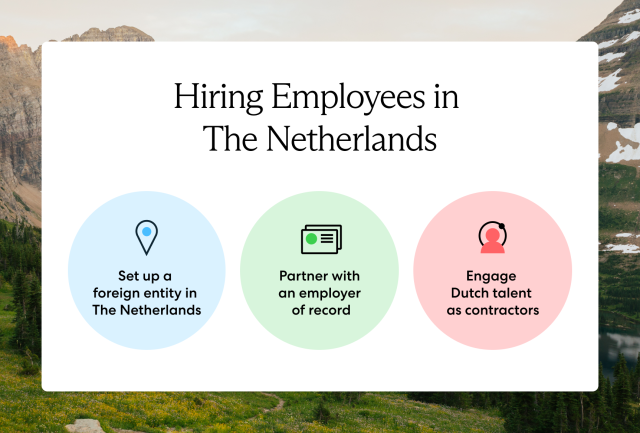The Netherlands’ high education standards and lifelong learning attitude have resulted in one of the world's most well-educated, skilled workforces.
While this country may be at the top of your list of potential recruitment markets, due diligence is crucial when engaging Dutch talent from abroad. Local employment regulations, such as payroll taxes and permanent establishment laws, expose global companies to unique compliance risks.
This guide summarizes the key points of Dutch labor law and details how to compliantly hire employees in the Netherlands from anywhere. Plus, find useful tips on mitigating risk and learn how to calculate total employee cost when building a Dutch workforce.
How to hire someone in the Netherlands?
Global companies that want to hire employees in the Netherlands directly must complete the following formalities:
- Register with the Chamber of Commerce (KVK)
- Register with the Netherlands Tax Administration (Belastingdienst)
- Consult a health and safety service provider
- Prepare a risk inventory and evaluation (RI&E)
- Sign employment contracts
- Arrange health insurance and pension for employees
- Incorporate new hires into the company payroll
Hiring employees in the Netherlands: 3 options
Global employers have three options for hiring employees in the Netherlands: setting up a legal entity, partnering with an employer of record (EOR), and engaging Dutch contractors.
We discuss each approach in detail below.

Set up a Dutch entity
To hire employees in the Netherlands directly, all foreign companies must establish a legal presence in the country and set up a Dutch business entity. The most common Dutch entities are the private limited liability company (Besloten Vennootschap) and the public limited liability company (Naamloze Vennootschap).
Setting up a legal entity in the Netherlands takes at least a month and involves the following steps:
- Opening a local bank account
- Registering with the Trade Register and Tax Office
- Notarizing articles of association
- Registering employees for insurance
- Conducting risk evaluation
Dutch law requires a civil-law notary to authenticate documents at each stage, so remember to source a qualified notary before beginning the incorporation process.
With a legal Dutch entity, foreign employers can directly hire local talent, minimize risk exposure, and handle all employment processes internally, from hiring and onboarding to running local payroll.
Despite its benefits, entity establishment is a lengthy and costly process that leaves you responsible for navigating local employment regulations and ensuring compliance on your own. This approach only makes sense if you plan to hire a large team and are ready to invest long-term in the Dutch market.
If you’re not ready to invest in physical infrastructure and undergo incorporation, consider partnering with an employer of record (EOR) instead.
Partner with an employer of record (EOR)
An EOR is a third-party legal entity that helps global companies hire, pay, and manage international teams. They make it easy to compliantly engage talent worldwide without setting up legal entities.
With access to global infrastructure, an EOR partner offers support at every stage of international employment, from hiring, onboarding, and immigration to running compliant global payroll and crafting country-specific benefits.
Plus, an EOR is familiar with international labor laws, ensuring you are up-to-date with all legislation changes and compliance requirements as you hire talent in new markets.
By partnering with a Dutch EOR, you can kickstart employment in the Netherlands and be fully operational in days rather than months without the added headache. This approach lets you easily test the Dutch market without making long-term investments or worrying about compliance.
Learn more: What Is an Employer of Record (EOR)?
Engage contractors in the Netherlands
Some global companies engage Dutch contractors from abroad instead of hiring full-time local employees. This approach involves key advantages, including added flexibility and lower commitments.
By engaging international contractors, foreign employers save time and resources they would otherwise invest in hiring, onboarding, and running payroll for a team of full-time employees. However, if you choose this route, be sure to avoid worker misclassification.
It’s relatively easy for foreign employers to classify Dutch talent as contractors while unknowingly establishing an employer-employee relationship with them.
Something as simple as offering work equipment to a contractor can result in an employer-employee relationship under local regulations. This subjects your business to backpay, tax arrears, and other misclassification penalties.
Practicing due diligence is critical for ensuring ongoing compliance with worker classification regulations in the Netherlands. We discuss this topic in greater detail later on.
Read more: Should You Hire a Contractor or an Employee?
How much does it cost to hire an employee in the Netherlands?
The cost of hiring an employee in the Netherlands is roughly 35-50% of an employee’s salary due to employer contributions to invalidity insurance, healthcare, an unemployment fund, child care, sickness and disability insurance, and pension. It also includes mandatory holiday pay.
Still, total employee cost in the Netherlands varies widely based on factors like employee age, marital status, occupation, income, company size, and company entity type.
Interested in hiring employees in the Netherlands? Use our employee cost calculator below to get reliable insights into employee costs and payroll contributions in the Netherlands:
Employment laws to know before you hire in the Netherlands
Before hiring employees in the Netherlands, global companies should familiarize themselves with Dutch employment laws, including collective labor agreements (CAOs), payroll regulations, employment tax laws, and leave entitlements.
We discuss each of these regulations in detail below.
Collective labor agreements (CAO) in the Netherlands
CAOs, or Collective Arbeids Overeenkomst, protect about 80% of the Dutch workforce. CAOs are employment terms that employers, employment organizations, and trade unions negotiate with one another that amend or supplement federal employment regulations.
For instance, a CAO in a particular industry can mandate higher minimum wages, shorter working hours, longer notice periods, and varying pension contributions for all covered employees in that industry.
CAO provisions in the Netherlands can apply company-wide or industry-wide, depending on the agreement. For instance, a company can negotiate with an employee organization to establish collective agreements that apply only to their company.
However, employer and employee organizations can also negotiate CAOs that apply to all employers across an entire industry. If the Ministry of Social Affairs and Employment declares a CAO binding to a whole sector, all companies within that industry must comply with that CAO.
In other words, you may be subject to CAO provisions even if you have not negotiated with specific trade unions or joined an employment organization.
Global companies hiring employees in the Netherlands must confirm which CAOs they are subject to, specify this information in their employment contracts, and ensure ongoing compliance to avoid fines and other penalties.
Payroll in the Netherlands
Payroll in the Netherlands is relatively straightforward. Like most countries, it follows a typical monthly cycle, provides holiday allowances, and ensures minimum wage protections.
Below, we list the main payroll regulations that global employers hiring in the Netherlands should know:
- Minimum wage. As of 2024, the Dutch federal government has abolished monthly, weekly, and daily minimum wages, fixing the minimum wage to an hourly rate of €13.27 for people 21 and over. The minimum wage ranges from €3.98 to €10.62 for people aged 15 to 20.
- Payroll cycle. The payroll cycle in the Netherlands is monthly, with employers paying wages at the end of each month.
- Holiday allowance. Employers must pay employees a holiday allowance worth at least 8% of the employee's gross earnings from the previous year.
Employment tax in the Netherlands
Employment taxes in the Netherlands include income taxes and statutory contributions to state-backed insurance programs, such as unemployment, health insurance, and pension plans.
The Dutch government reviews and sets income taxes and other tax measures annually. As of 2024, federal law divides income taxes in the Netherlands into the following two brackets:
- Income up to €75,518: 36.97%
- Income over €75,518: 49.5%
Employees and employers must also pay a social security tax, which consists of the following two programs:
- Employee insurance. This employer-only contribution covers unemployment, sickness, and disability insurance. Contribution rates range from 2.64% to 7.64%, depending on the fund, company size, and type of contract.
- National insurance. This employee-only tax covers pension, long-term care, child benefit, and survivor’s benefit. Contribution rates range from 0.10% to 17.90%.
While many employers in the Netherlands appreciate the country’s evolving tax rates, it presents a unique compliance risk for global companies unfamiliar with local regulations. Foreign employers must regularly monitor annual rate changes to ensure compliance.
Leave entitlements in the Netherlands
In addition to the above employment regulations, Dutch employers must comply with leave requirements, including annual, maternity, paternity, parental, and sick leave.
We outline each of these in detail below:
- Annual leave. Minimum annual leave is four times the employee’s standard weekly working hours. For instance, an employee who works 40 hours per week receives a maximum of 160 hours of paid annual leave or 20 days.
- Maternity leave. Maternity leave in the Netherlands is 100% paid and lasts 16 weeks—six weeks before childbirth and 10 weeks after.
- Paternity leave. Fathers receive one week of 100% paid paternity leave starting after childbirth. Within six months after the birth, they can take an additional five weeks of leave at 70% pay.
- Parental leave. Working parents also receive 26 weeks of shared parental leave per child, which they can use flexibly within the first eight years of each child’s life. They receive 70% of their salary for the first nine weeks.
- Sick leave. Employees receive 70% paid sick leave for up to two years. Employment contracts and CAO provisions may provide a higher pay rate.
Dutch federal law does not guarantee employees paid time off for annual public holidays, although CAO provisions and employment contracts may provide it.
Other Dutch employment laws to know
Global companies should also familiarize themselves with the following Dutch employment regulations:
- Working hours. A standard work week in the Netherlands is 40 hours, or eight hours per day, five days per week. Employees may work 12 hours maximum per shift, with work contracts stipulating overtime pay.
- Probationary period. The maximum probationary period for permanent contracts is two months. For fixed-term contracts, it’s one month.
- Termination. Notice periods are mandatory for permanent contracts but not fixed-term contracts, and the employer’s required notice period is up to four months, depending on contract duration. For employees, it’s one month.
- Severance. Employers must provide severance pay when terminating an employee’s work contract early unless the employee agrees to the dismissal. The severance amount varies depending on the employee's salary and length of service.
Compliance risks when hiring employees in the Netherlands
Ensuring compliance with local employment regulations is critical for your success when hiring employees in the Netherlands from abroad.
Global companies' primary risks when operating in the Dutch market involve employee classification, payroll tax regulations, permanent establishment, and immigration requirements.
We discuss each of these in detail below and offer tips for mitigating risk.
Misclassification
Worker classification refers to how you designate talent according to local employment regulations—as employees or contractors.
If you hire employees, classifying talent is relatively straightforward: you classify them as employees, incorporate them into the company payroll, and provide them with the full range of employment rights under Dutch law, such as holiday allowance and leave entitlements. However, if you hire Dutch contractors, be aware of the risk of misclassification.
Worker classification regulations in the Netherlands strictly limit what constitutes a contractor-client relationship, and any working relationship that deviates beyond these boundaries faces hefty misclassification penalties.
For instance, if you influence who your contractor hires to help complete a job or you maintain a consistent payment schedule with your contractor, this may constitute an employer-employee relationship under Dutch law. Or, if your contractor earns more than 70% of their income solely from your work arrangement, they are not a contractor—they are an employee.
Dutch legislation provides a detailed list of conditions that determine proper classification. If local regulators determine your workers are employees rather than contractors, your business can face time-consuming litigation and misclassification penalties, including fines, benefits arrears, and back taxes.
Many foreign employers seek third-party legal counsel to mitigate misclassification risk while engaging Dutch contractors from abroad. If you seek legal counsel, be sure to choose a properly vetted firm with experience in Dutch employment law.
Read more in our complete guide to employee misclassification.
Incorrect payroll contributions
One of the most challenging aspects of Dutch employment law is navigating local payroll regulations. Payroll taxes in the Netherlands include income taxes and contributions to social security.
Employers contribute to schemes like national healthcare, unemployment insurance, child care, invalidity insurance, and pension. Employers must also pay their Dutch employees a mandatory holiday allowance.
Dutch social security schemes and their rates may vary drastically from those in your home country. Employers must calculate each contribution as a percentage of the employee’s base salary and remit all income tax and social security contributions to the Dutch Tax and Customs Administration on behalf of themselves and their employees.
Exercising due diligence is critical for ensuring timely, compliant payments and avoiding errors and delays when running payroll for your Dutch team.
Read more in our complete guide to payroll tax.
Permanent establishment
Hiring employees in the Netherlands may subject your business to local corporate taxation, especially if you operate through a local entity. Any foreign company operating in the Netherlands through a fixed location constitutes a permanent establishment (PE) and faces a corporate tax liability.
Fortunately, PE regulations in the Netherlands are relatively straightforward. According to Dutch law, a foreign company is a PE if it owns physical premises in the Netherlands that can act as a self-sufficient business, such as a retail outlet, a workshop, or a factory with office space.
Your presence in the Dutch market doesn’t constitute a PE if you only carry out ancillary activities from a physical location, such as operating a storage space, conducting research at a local facility, or managing a goods depot.
Depending on your approach to hiring employees in the Netherlands and the activities your Dutch employees carry out on your behalf, it may be challenging to clarify your PE status while operating in this market.
Understanding the nuances of local corporate tax law is critical for mitigating PE risk and avoiding tax arrears, fines, limited business opportunities, and other noncompliance penalties. Many global companies hiring Dutch talent partner with a global expert, like an EOR, to help ensure tax compliance.
Immigration requirements
Most of the talent you hire in the Netherlands will likely be Dutch citizens who don’t need work visas or permits to legally live and work in the country. Still, there may come a time when you need to hire a foreign national who doesn’t hold a Dutch residence permit.
Or, perhaps a domestic employee wants to relocate to the Netherlands as a part of your global mobility offering. In either case, your HR team must be ready to quickly navigate Dutch immigration and acquire work visas and permits without delay.
Obtaining the necessary authorizations, translating documents, and ensuring ongoing compliance requires considerable time and resources. Without a strategic approach to immigration, global companies face operational delays and can also experience employee churn.
Be sure to enlist an experienced HR team. Provide them with the necessary resources to ensure immigration procedures don’t stall daily operations or prevent you from securing top Dutch talent as you enter this market.
Compliantly hire in the Netherlands with Velocity Global
Lengthy incorporation procedures and compliance risks can make hiring employees in the Netherlands seem overwhelming. Fortunately, you don’t have to go it alone.
Velocity Global’s EOR solution makes it easy for global companies to quickly and compliantly engage talent in more than 185 countries, including the Netherlands, without setting up legal entities or worrying about violating local employment regulations.
Our expert team handles everything from hiring, onboarding, immigration, and compliance to running global payroll, administering global benefits, and offering ongoing HR support for your Dutch workforce on your behalf.
With Velocity Global at your side, you can hire employees in the Netherlands and build a distributed workforce across the country with ease. Contact us today to get started.
Disclaimer: The intent of this document is solely to provide general and preliminary information for private use. Do not rely on it as an alternative to legal, financial, taxation, or accountancy advice from an appropriately qualified professional. © 2024 Velocity Global, LLC. All rights reserved.
Topic:
Country Guides



